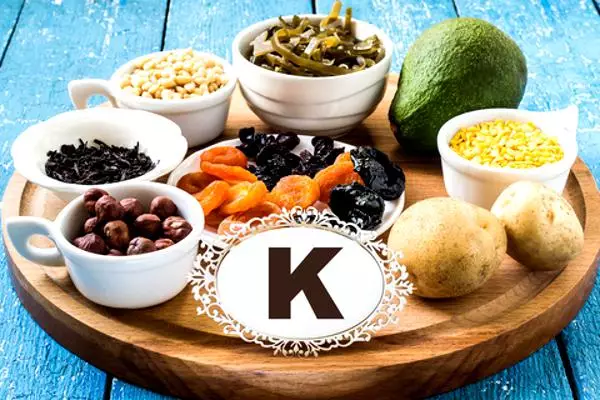 Potassium is – second to sodium – the most important electrolyte in the body. Having it at the right level is necessary to maintain an optimal neuromuscular conduction. While sodium is mostly accumulated outside cells, potassium is actually mostly located inside cells. Both of these ions maintain the activity of an enzyme that maintains the right concentration of them and ensures that impulses are created within cell membranes. The potassium level being too low leads to serious disorders in functioning of the nervous, cardiovascular and muscular system.
Potassium is – second to sodium – the most important electrolyte in the body. Having it at the right level is necessary to maintain an optimal neuromuscular conduction. While sodium is mostly accumulated outside cells, potassium is actually mostly located inside cells. Both of these ions maintain the activity of an enzyme that maintains the right concentration of them and ensures that impulses are created within cell membranes. The potassium level being too low leads to serious disorders in functioning of the nervous, cardiovascular and muscular system.
Potassium serves many roles in the body – it is responsible for conducting neural impulses, it conditions proper functioning of skeletal muscles and the heart muscle. It ensures a water – electrolyte balance in the body, it regulates the body’s pH. It influences the synthesis of insulin, it activates plenty of cellular enzymes.
There are plenty of mechanisms inside the human body that are there to maintain an optimal potassium level in blood, which is about 3,5 – 5,5 mmol/l. It especially applies to regulating the level of absorbing potassium from the gastrointestinal tract, excreting potassium with urine and transporting potassium from the extracellular to the intracellular space. They allow the level of this element to maintain a fixed value; even after eating the potassium level in blood only rises slightly.
The daily potassium requirement for an adult is 2000 mg on average. Is it possible to provide this kind of amount through the diet alone? What contains the most potassium? A well balanced diet can provide the recommended dose of potassium, which is demonstrated by the fact that potassium deficiency usually doesn’t occur in the body due to not consuming enough of it. However, it doesn’t mean that insufficient potassium level in the body cannot be found. It can – and pretty often at that, which is due to presence of many disorders.
Our everyday diet has enough products that provide large quantities of potassium. We’re mostly talking about plant-based products. Especially worth noting are nuts, seeds, poppy and cocoa. The last one has no matches – 100 g of cocoa contains as much as 1900 mg of potassium. Pistachio nuts have about 1000 mg of potassium, all the other nuts contain 600 to 800 mg. When it comes to poppy seeds, they have 960 mg of potassium per 100 g of weight.
How about vegetables and fruits? The highest potassium content can be found in dried fruits – it can even reach 650 – 950 mg.
Sample potassium content in fresh fruits and vegetables is (per 100 g):
– dry soy 2100 mg
– navy bean 1200 mg
– dry pea 940 mg
– parsley leaves 700 mg
– avocado 600 mg
– potatoes 400 mg
– melon 350 mg
– currants 350 mg
– tomatoes 240 mg
What else contains potassium besides the above listed fruits and vegetables? Potassium can also be provided by consuming grains that the less processed the more of this element they contain. Whole grains on average provide 300 – 400 mg of potassium per 100 g.
Slightly less potassium can be found in animal-based products – dairy, eggs, fish or meat. Products of this type contain that element in the amount of 100 – 150 mg. Potassium is also present in mineral water or tomato juice – consuming them is the fastest way to replenish the potassium supply in the body, especially in case of food poisoning that results in vomiting and diarrhea.
A diverse diet based on fresh and as unprocessed as possible products should provide enough potassium for a healthy person. The potassium requirement is slightly different for people suffering from chronic diseases – which makes deficiencies very likely.
Not having enough potassium in the body is called hypokalaemia. In most cases it results from increased loss of potassium through kidneys or the gastrointestinal tract, or it can be related to having hormonal disorders or cardiovascular diseases.
The factors that increase the potassium requirement are:
– hypertension
– taking diuretics or laxatives
– vomiting and diarrhea
– insulin treatment for diabetes
– excess consumption of alcohol and coffee
– intense physical activity
– Cushing’s syndrome
– severe burns
– chronic intestinal diseases
– pregnancy and lactation
Those at risk of being exposed to the above mentioned factors should make sure to get a higher potassium supply – even twice the recommended 2000 mg. It is the best to provide it in form of a well-absorbed supplement, such as organic potassium citrate. Regular supplementation, which supplements the natural sources of potassium in the diet, can effectively prevent this element’s level from getting too low and the symptoms of potassium deficiency from developing.
The most common symptoms are:
– overall weakening
– heart disorders
– less strength in muscles
– apathy, loss of focus
– limb swelling
– hypertension
– kidney disorders
One should not put away potassium supplementation until the above mentioned symptoms occur – the most important thing is preventing potassium deficiency and ensuring proper functioning of the most crucial systems in the body – the circulatory and nervous ones.
You must be logged in to post a comment.
Visitor Rating: 5 Stars